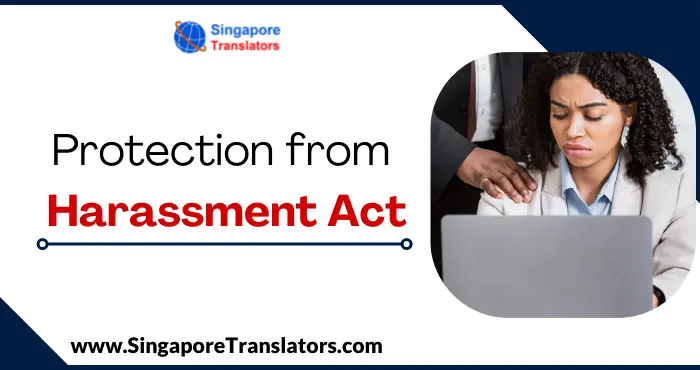The Protection From Harassment Act (POHA) was introduced several years ago, in November 2014. The primary motive behind passing this law is to defend people from being a victim of harassment or stalking, whether online or physically, at the workplace.

This law does so by turning it into a criminal offense to get involved or perform harassment activities. As well as suing the harasser for compensation, the victim has full rights to sue the harasser in the harassment protection court.
Offenses covered by the POHA in Singapore
Causing harassment, alarm, and distress
The POHA criminalizes harassment, alarming or distressing behavior towards a victim.
In section 3 of harassment, any person who intentionally or unintentionally commits harassment, distress, or alarm (either through verbal or physical abuse, insults, threats, or any other form of communication) will be punished.
For intentionally engaging in harassment activities, distress or alarm, the maximum punishment is up to $5000 in fines and up to six months in jail. If the offender repeats the act, the maximum punishment is doubled.
Also, keep in mind that as per section 4 of the protection of harassment act, threatening, insulting acts, or using abusive language are considered as causing the victim to feel distressed, harassed, or alarmed, sufficient to constitute a criminal offense. As a result, if any of the individuals doesn’t intend to cause distress, alarm or harassment, an individual will still be considered a suspect for such criminal activities.
Get Fast & Accurate official notarization for ICA, MOM, MFA.
Causing fear or provocation of violence
A person may be charged with an offense for intentionally causing someone to believe that unlawful violence will be used against them, or if such a person behaves likely to induce such a belief in them. Unlike those offenses described above, this offense poses a threat of physical violence, whereas harassment, alarm, or distresses are non-physical harms.
On a publicly-accessible website, X posts threatening and abusive remarks. Within weeks, X posts Y’s identity information on the same website, and he threatens to beat Y up. In this case, X has violated the law by threatening physical violence.
An individual who causes fear or provocation of violence may be fined up to $5,000 and/or imprisoned for 12 months. The repeated offenses will be subjected to double punishment.
Unlawful stalking
According to POHA, unlawful stalking comes under the category of a criminal offense. Stalking will be regarded as unlawful in the following circumstances:
- Stalking-related acts or omissions;
- Causes harassment, alarm or distress; and
- Intentionally caused harassment, alarm, or distress or was known to cause it.
Examples of acts of unlawful stalking include:
- Following someone
- Keeping an eye on someone in an area near their home or business
- Ignoring objections to stop leaving gifts or giving gifts to the person
- Monitoring someone’s every move
- The repeated distribution of photos of a classmate with other classmates reveals their identity.
If found guilty for the criminal offense of unlawful stalking, a person will have to pay the fine of $5000 and/or a jail sentence of up to 12 months or both in some cases. If you repeat the same crime repeatedly, the maximum penalty will be doubled.
Doxing
Another offense that comes under the category of harassment as per the protection from harassment act is doxing. This act refers to the sharing of the personal identity and important information of the person with the intention to threaten, facilitate or harass them. In this new offense, undesirable online behavior will be better protected.
For example, doxing is when private information about someone is shared on social media and others are asked to teach him a lesson.
If personal information is published with the intent to harass, there is a fine of up to $5,000 and/or a 6-month prison term.
The penalty for publishing personal information in order to cause or facilitate violence is up to $5,000 and/or up-to 12 months in prison.
For repeat offenders, these maximum penalties are doubled.
Penalties and Liability under the POHA for Acts of Harassment in Singapore
Individuals and entities may both be held liable for harassment-related offenses.
An individual and an entity (such as a company) can be held liable for harassment-related offenses.
Prosecution of overseas offenders
Overseas POHA offenders may be prosecuted if the following conditions existed at the time of the offense.
- The victim was in Singapore; and
- As much as the offender knew or was reasonably certain the victim was in Singapore.
For example, when a foreign offender circulates to their classmates revealing photographs of the victim (who is in Singapore), where the offender knows that the victim studies there, it may be deemed unlawful stalking in Singapore, and the offender may be convicted.
Enhanced penalties for offenses against certain victims
Offenses committed against two particular victim groups are punishable with harsher penalties.
Offenses against vulnerable people, i.e., those with mental or physical disabilities, will now have doubled penalties regardless of their age. For example, the Individuals or entities violating the offense of inciting fear or provocation of violence against vulnerable persons are subject to fines up to $10,000 and/or jail terms up to 24 months.
The penalties will be enhanced when the victim is in a close relationship with the offender committing a crime. Offenders who know that the victim had a close relationship with them will not only face harsher penalties but their maximum penalties will also be doubled.
For their relationship to be considered an intimate one, the victim and offender do not have to be married. Instead, the court will be identifying the relationship between the victim and offender depending on the provided facts and circumstances.
In determining the relationship, the court will consider based on following factors:
- When it comes to daily life tasks and duties, they either share them or not.
- If both victims and offenders are residing in the same house
Other Remedies Provided Under the POHA
Remedies for victims of harassment
Besides the criminal section, the victim can sue the harasser in court by taking civil action against them for the damages done. The victim also has the authority to apply for the protection order or enhanced protection order to restrict the harasser from performing or involving in any unwanted behavior or communication.
There is no doubt that the victim’s family members might also be threatened because of the unwanted behavior and activities of the harasser. Considering the situation, the Protection Order (PO) and Enhanced Protection Order (EPO) are not just covering the victims. Still, they also cover persons associated with the victims, including family members and immediate relatives.
Furthermore, the local police have the authority to arrest the harasser without a warrant if they reasonably suspect that they have failed to comply with an EPO or PO.
Remedies for victims of falsehoods
Among the remedies available to private entities and individuals under POHA are remedies for falsehoods committed against them.
Following is a list of possible orders to combat falsehoods:
Stop publication order– Offenders are expected to cease publishing false statements by a particular deadline.
General and targeted correction order– The offender must publish a correction notice in a specific format within a given period.
Disabling order– An order requiring an internet intermediary to stop users from accessing content that allegedly spreads misinformation. When the court believes an accelerated disabling order is required, an interim disabling order (for the same purpose) may be granted while the Disabling order is still being made.
The Protection from Harassment Courts
The protection from harassment courts offers all in one solution to all the harassment victims in Singapore. This court looks after civil and criminal cases as per the POHA and provides simplified filing procedures and shortened hearing dates to the harassment victims looking for compensation and court orders.
In the case of claims of up to $20,000 and requests for POs, for example, users can submit an online claim form instead of filing an Originating Summons.
Protection from Harassment Courts operates on a four-week schedule for substantive protection orders, 48-72 hours for fewer emergency protection orders, and 24 hours for urgent cases that involve violence.
Conclusion
Hopefully, the above article might have helped you in knowing the details associated with the harassment act. Read each factor thoroughly and avoid making any mistake. In case, you need any document translation services Singapore, you can get every sort of translation at Singapore translators.

